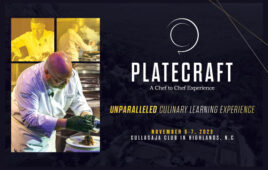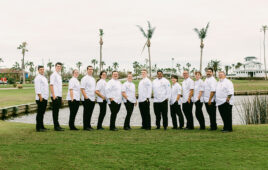|
This Month’s Recipes
•Roasted Muscovy Duck Breast with caramelized Belgian endive, fresh figs and orange blossom vinaigrette •Seared Sea Scallops with chestnut dumplings, fig tapenade, and cider sage sauce |
The history of the Old Town Club (OTC) in Winston-Salem, N.C., begins with Mrs. Mary Reynolds Babcock, daughter of the founder of the R.J. Reynolds Tobacco Company. Mrs. Babcock lived with her husband, investment banker Charles Babcock, in Connecticut until she acquired the family business upon the death of her father in 1934. With her $30 million inheritance, she began to indulge her great interest in philanthropy.
In 1939, Mrs. Babcock built the Old Town Club golf course and clubhouse on the family estate in Winston-Salem, with the help of famed golf course architect Perry Maxwell, who had recently renovated Augusta National. Twelve years later, she provided another 300 acres from the tract to relocate Wake Forest College from Wake County. Old Town has since served as the home course for the school’s storied golf program (three NCAA championships and such players as Arnold Palmer, Jay Sigel, Lanny Wadkins and Curtis Strange, just to name a few).
Four years ago, when the Old Town Club sought to raise the profile of its culinary offerings to match the club’s rich golf tradition, a nationwide search was conducted for a chef that eventually led to the selection of Dion Sprenkle, Chef de Cuisine from the Palace Hotel in Manhattan, who previously had honed his skills at the popular Gotham Bar and Grill and River Café.
A New York-area native and graduate of The Culinary Institute of America in Hyde Park, Sprenkle left his position at The Palace, and his 14 union line cooks, for an attractive club opportunity in quieter, and more affordable, Winston-Salem. He recently took the time to provide interesting insights into how he’s successfully transferred his big-city experiences into a more genteel setting.
 |
| Dion Sprenkle, Executive Chef, Old Town Club |
Q Dion, you mentioned that the OTC membership is getting younger and therefore more receptive to new dishes and other changes you’ve tried to introduce since your arrival. What strides have you made in this area?
A My staff and I have made considerable strides, starting with the dining room, where we’ve added homemade vinegar and infused oil to the tables, along with homemade fresh breads daily. We’ve also introduced a Signature section to our menu that changes monthly, but doesn’t disturb the Classics side. This allows me to be creative and introduce new products from all over the world to the membership.
Q After being Chef de Cuisine at the Palace Hotel, one of the biggest challenges you faced after arriving at OTC was the pool snack bar situation. This may have seemed like an amusing contrast, but I know you faced some serious timing and staffing issues. How did you solve them?
A At the snack bar, we have a small a la carte kitchen with an attached 8-foot by 3-foot room that’s usually run by high school or college kids. This year, we decided to knock down the wall that separated the kitchen, and we hired a skilled cook to run this outlet from opening to closing. This allowed the kitchen to fully communicate with the snack bar, which now has its own pickup window. Our pickup times went from 10 minutes to approximately two minutes. We also added wrought-iron steel baskets and cones with London newspapers inside them, to give a bistro feel.
Q Like all new chefs, another challenge you faced when you came to OTC was selling yourself, and your style, to the membership. How did you make this happen?
A When I first arrived, my initial challenge was training the kitchen staff for what it would take to offer five-diamond and five-star cuisine and service—in other words, being consistently good on a daily basis. From there, I let the food do the talking.
Since then, I’ve made it a habit to walk around the dining room and explain to the membership what we are making and how everything is prepared. Sometimes you just have to tell them that we have the best food in town, to make sure they know it.
Q One thing that’s universal for all clubs is how chefs and F&B managers must sort out the complaints from the constructive criticism they get from members and guests. Some diners only have their own interests in mind, while others see the big picture and really want their club to shine. How do you deal with this at OTC?
A OTC is no different than any other club in America, Every chef who’s a friend of mine and who is working at a club has the same issues. We write a daily report for lunch and dinner that includes all comments from the members about their experiences in the dining room. We log them and then identify who is giving constructive criticism, and who is the chronic complainer. But whenever there is a complaint, I will investigate it to find out its cause.
Q Dion, cross-training of kitchen employees is essential, especially at a small-to-medium club like OTC. How have you been so successful in this area, and also in promoting entry-level staff?
A My years of training in New York City prepared me for this move to a small town with its limited pool of cooks. I personally train each individual, to the level where they need to be, in everything from knife skills to organization to hands-on cooking. It takes a lot of work, but this is how I was trained back in the day. I started out cross-training my dishwashers to prep, gave them a raise, and they are a great utility staff to have, especially for banquets. My garde manger cook never set foot in a kitchen or held a knife in her hand. Now, she could probably win “Hell’s Kitchen.”
Q Chef, I’ve always believed that having a strong a la carte background like yours, as opposed to catering experience, is more beneficial when going into a club situation, because the logistics of doing large parties is easier to pick up than it is to develop an understanding of how to turn out 15 interesting dishes at one time. How do you see it?
A I agree with you 100 percent. I was mentored by some of the best chefs in the world and they owned independent restaurants. I believe that any young cook coming out of culinary school should first work in an a la carte kitchen to gain the experience of producing dishes under pressure, night after night. Then they can build a repetoire of dishes and recipes to use when they become a chef. This should be the natural progression of becoming a chef.





